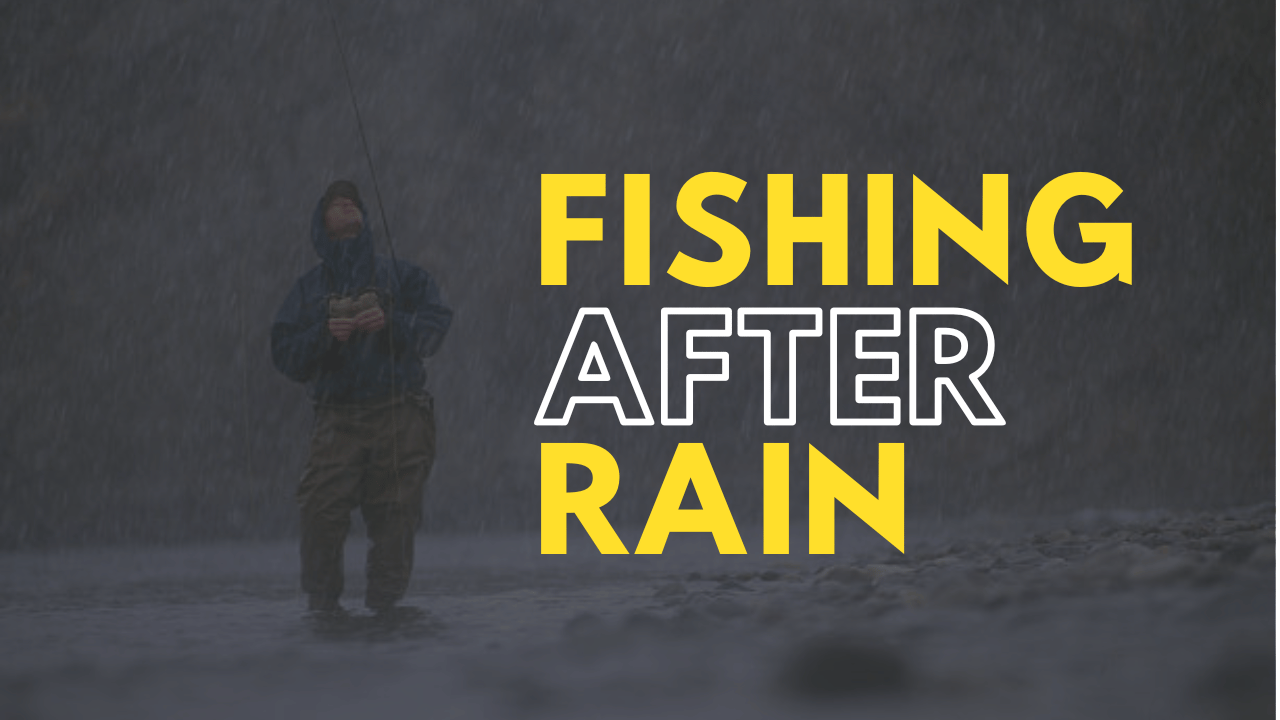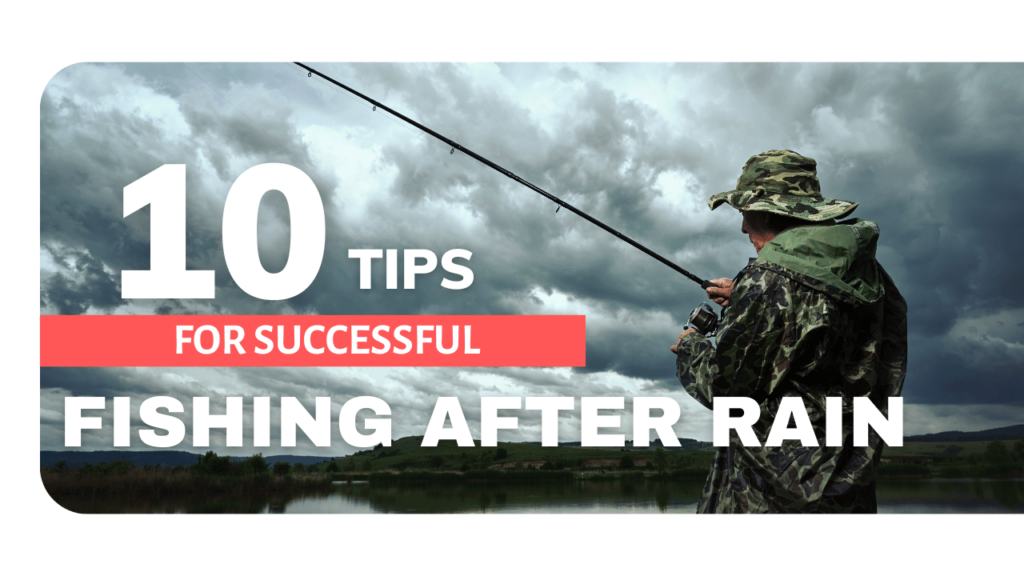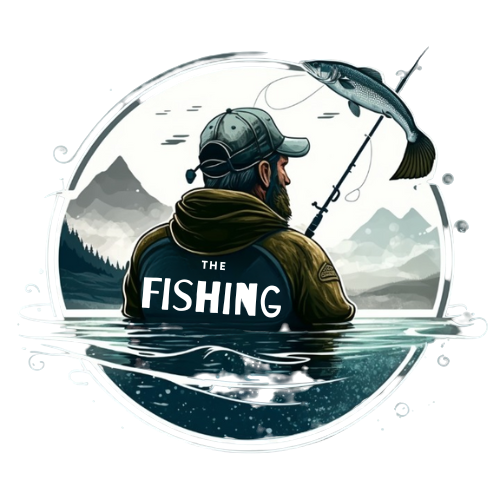Did you know that rainfall can significantly impact fishing conditions? The rainfall impacts underwater ecosystems in fascinating ways, offering keen anglers unique opportunities. Let’s dive into the science behind why fishing after a rain shower may just be the secret to a bountiful catch.

Table of Contents
- So, Is fishing good after rain?
- Things to consider for fishing after rain
- How does rain affect water conditions and fish behavior?
- What types of fish are most likely to bite after a rainfall?
- 10 Tips for successful fishing after rain
- Benefits of Fishing After a Rainfall
- How to Choose the Right Bait and Lure After a Rainy Day
- Is it better to fish before or after rain?
- Fishing before the rain vs in the rain vs after the rain
- FAQs:
- Conclusion
So, Is fishing good after rain?
This is a question that has been asked time and time again. And the answer, my dear friends, is – it depends.
Yes, I know that’s not the clear answer you were looking for, but hear me out. Rain does affect fishing in more ways than one.
For starters, it affects water conditions and fish behavior. When it rains, the water gets murky and the current becomes stronger.
This change in water condition may affect the normal feeding patterns of many fish species. But here’s some good news – predatory fish tend to take advantage of such situations and become active hunters during this period.
So if you’re looking to catch bass or any other big fish species, this could be your lucky day. The success of your fishing trip after a rainfall depends heavily on other factors too though – such as pressure drops, cold fronts or even light drizzles as opposed to a heavy rainstorm – which can all play a role in determining whether or not you will catch any fish at all.
Some fishermen swear by topwater baits during these periods while others find success with live bait or lures that mimic fish food washed down into streams by rainwaters.
Read More: Trout Fishing in the Rain: A Guide to Success
Things to consider for fishing after rain
When considering fishing after a rainstorm, there are several key factors that you should bear in mind to maximize your chance of success and ensure a safe and enjoyable experience.
1. Fish Species: The behavior of different fish species can vary before, during, and after the rain. Some species, like bass, catfish, carp, trout, and pike, may be more active and feed aggressively. In contrast, others may become more docile and feed less after the rain. Therefore, knowing how the species you’re targeting reacts to rain can influence your fishing success.
2. Water Conditions: Rain can greatly affect water conditions, changing the temperature, clarity, and oxygen levels, which in turn can affect fish behavior and feeding patterns. Heavy rain can cause flooding and result in silty, dirty or cloudy water, that might make fishing more challenging. Understanding and adjusting to these changes in water conditions will be crucial for successful fishing after rain.
3. Fishing Location: Fishing in calmer areas where the water or current is not as strong could increase your chances of success. Baits that attract fish even in muddy water can be beneficial. Also, consider fishing on the leeward or sheltered side of structures, in deep holes, and places where fish may find shelter from increased currents and larger swells and waves.
4. Fishing Gear: Dress appropriately for the conditions. Layer your clothing to maintain warmth and wick moisture away from you, which can offset the potentially cold and uncomfortable conditions of fishing during or after the rain. Utilize spinnerbaits that create flash and vibration, as these can be ideal for fishing after a rainstorm, especially if you’re targeting bass in muddy water.
5. Fishing Strategy: Generally, fishing before the rain can be advantageous since the dropping barometric pressure, decreasing water and air temperatures, and reduced light can give fish a distinct tactical advantage over their prey and trigger them to feed aggressively. However, fishing after the rain can also be productive if you slow your approach way down.
How does rain affect water conditions and fish behavior?
Rain can have a significant impact on water conditions and fish behavior. When heavy rain falls, it can cause water temperatures to drop rapidly due to the influx of cooler water from feeder creeks.
This sudden drop in temperature can shock fish, causing them to become less active and more difficult to catch. However, if the rainfall is light or moderate, it can actually have a positive impact on fishing by oxygenating the water and flushing out debris that may have accumulated over time.
In addition to affecting water temperature and oxygen levels, rain affects the visibility of the water. When it rains heavily, runoff from surrounding areas can make the water murky and muddy.
This can make it harder for fish to see your bait or lure, which makes it harder for anglers to get a first fish bite in. Fish behave differently in murky waters as they tend to move into deeper waters where there is clearer visibility.
Fish also experience changes in pressure when rain falls heavily which affects their swim bladder making them less likely to bite. However, during light rainfall or after rain clears up during shallow waters are prime areas for fishing as smaller prey like worms come out of hiding places where fish feed on frequently while smaller fish are swimming around shallow waters.
Overall, how rain affects fishing depends on various factors such as the type of fish you are targeting and how heavy the rainfall is. Anglers often cannot predict exactly how much or what type of rainfall will occur so they must be adaptable with their approach when trying different types of baits such as plastic worms or lures that mimic other fish movements in order to target bigger fish who tend not be affected by these changes in weather patterns.
What types of fish are most likely to bite after a rainfall?

One of the most exciting things about fishing after heavy rains is that some of the biggest and most elusive fish tend to be more active during these times. In fact, many experienced anglers will tell you that if you want to catch bass after a rain event, you’re in for a treat. This is because bass are known for their aggressive feeding activity, and cooler temperatures brought on by rainy weather tend to keep fish activity and stimulate their appetite.
So, if you’re looking for a big catch, make sure to hit the deeper water areas where these fish like to hide out. But it’s not just bass that are more active after a good rain.
Other fish species like catfish and crappie also tend to be more receptive to live bait during these times. Why?
Well, one reason is that runoff water can sometimes stir up the bottom sediment and expose tasty morsels that these fish love to munch on. Additionally, rain cools down the water temperature which also affects fishing behavior – many species become more active and willing to bite when water temperatures reach a certain threshold.
However, it’s important to remember that not all fish will be biting every time it rains. Some species might be less affected by barometric pressure changes or simply prefer clearer waters over muddy ones caused by heavy rainfall.
That said, don’t give up on fishing after rain just because you didn’t catch anything right away – patience can often yield great results when it comes to fishing! Choosing the right bait and lure is equally important as understanding how different fish species behave after rainfall – so don’t forget your plastic worms or other favorite lures when heading out on your next rainy day fishing expedition!
Read also: Is Fishing Good After A Hurricane?
10 Tips for successful fishing after rain

When it comes to fishing after a heavy rain, there are some tips that can help you increase your chances of catching fish. Here are 10 tips for successful fishing after rain:
1. Look for small streams and creeks that empty into larger bodies of water.
These areas will often see an influx of small fish and other aquatic creatures being washed downstream, providing food for hungry fish in the bigger body of water.
2. Check the barometric pressure before heading out on your fishing trip.
If there is a drop in air pressure or if the pressure has recently dropped due to the storm, this can be a good indication that fish will be more active and hungry.
3. Use topwater baits when possible.
The sound and motion created by these baits can attract fish from a distance, even in muddy water.
4. Keep an eye on water temperature.
After a rain, water temperature can drop a few degrees which can trigger feeding behavior in many species of fish.
5. Try using plastic worms or other artificial baits that mimic natural prey items like worms or insects that may have been washed into the water by the rain.
6. Fish around vegetation as this area will often have more insects and other small creatures which attract baitfish which in turn attracts predator species like bass and crappie.
7. If you’re saltwater fishing after rain look for areas where fresh water runoff is entering the ocean as this will attract many different species of ocean predators including sharks, tarpon, snookt and redfish looking for an easy meal.
8. Don’t be afraid to get soaking wet when it rains! Some anglers swear by “rain fishing”.
They say they catch more fish when they’re out there braving inclement weather than on clear sunny days because there’s as much food floating around below them as above!
9. Consider using live bait instead of lures or artificial baits after a heavy rain.
Live bait like worms, minnows or crickets can be more effective because they move and wiggle in the water which can attract fish.
10. Be patient!
Fishing after a rain can be challenging but if you’re patient and persistent, your chances of catching fish will increase. Don’t be discouraged if you don’t catch anything right away, keep switching up your bait and techniques until you find what works best for the conditions.
Read also: How much is a fishing license cost?
Benefits of Fishing After a Rainfall
If you’re asking me, “Is fishing good after rain?” My answer is a resounding YES! There are many benefits to fishing after a rainfall, and it’s definitely worth braving the wet conditions to try your luck.
Here are just a few reasons why:
When it rains, the water temperature drops, which can trigger feeding activity in many fish species. This means that you’re more likely to find active fish that are willing to bite.
Additionally, rain cools down the water temperature in shallow water faster than deep water. This can lead to an increased concentration of fish in deeper waters where the temperature is more stable.
Heavy rainfall can increase oxygen levels in the water which is important for fish survival. This rise of oxygen levels will make fish more alert and ready for action so it’s more likely that they will chase your bait or lure.
During a light drizzle or a normal rain storm, smaller insects and worms get washed into the body of water along with dirt and other debris which provides food for hungry fish who come closer to shorelines looking for food. In short, fishing success is all about timing and strategy.
If you want to catch an abundance of fish then consider going saltwater fishing after even small amounts of rain have fallen because this triggers feeding patterns and migration habits among different species of saltwater fish such as Snook or Tarpon. Don’t be deterred by wet or cold weather conditions – instead embrace them as an opportunity to catch some great catches!
Read also: Is fishing a sport or hobby?
How to Choose the Right Bait and Lure After a Rainy Day
After a rainy day, selecting the appropriate bait and lure can significantly impact your fishing success. The key is to choose options that create ample vibration and noise to attract fish, considering the altered conditions caused by the rainfall. Here’s a guide on how to choose the right bait and lure after a rainy day:
Opt for Lures that Create Commotion: Topwater lures should be your go-to choice after a rainy day. These lures generate substantial commotion on the water’s surface, making them highly visible and enticing to fish. They work particularly well during low light conditions caused by overcast skies.
Consider Lures with Flash and Vibration: Spinnerbaits are an excellent option for rainy days. Their blades produce flash and can be manipulated at different depths within the water column, increasing their effectiveness. Additionally, crankbaits mimic the movement of baitfish and generate significant vibration, attracting fish even in post-rain conditions.
Explore Lures with Unique Design: Chatterbaits are worth considering due to their distinct design, which combines vibration, flash, and action. The combination of these factors can make them highly enticing to fish, especially after rainfall.
Assess the Targeted Fish Species and Water Conditions: When selecting a lure, take into account the specific fish species you’re targeting and the current water conditions. For example, if the water is muddy or murky after rainfall, choose lures with pronounced vibration and noise to compensate for reduced visibility.
Read also: What Do Fish Do When It Rains? Unveiling Aquatic Secrets!
Is it better to fish before or after rain?
Fishing AFTER the rain is much better than wasting your time trying to catch fish before the rain begins.
Here’s why: First off, one of the main reasons why I believe it’s better to fish after the rain is because of the cooler water temperatures.
After a rainfall, the air temperature drops and so does the water temperature. Cooler water means that there is an increase in dissolved oxygen in warm water, which can lead to more feeding activity from fish.
This makes it easier for anglers to catch larger fish such as largemouth bass who are more active in oxygenated water. Another reason why I see many anglers prefer fishing after a rainfall is because feeder creeks and rivers tend to flow into main bodies of water during and after a rain event.
This influx of fresh, cooler water brings in new nutrients and fish food for other species beyond bass which makes them more likely to be biting throughout various depths all over the lake. Additionally, with new food sources available it will trigger different feeding events that occur at different times giving you greater chances of catching multiple types of fish even if they’re not typically known to hang out together!
You can read also: What Is Fly Fishing? How Doest fly fishing Work
Fishing before the rain vs in the rain vs after the rain
| Before the Rain | In the Rain | After the Rain |
|---|---|---|
| Stable weather conditions allow fish to establish feeding patterns. | Fish may seek shelter in deeper waters or near structures. | Increased oxygen levels and food supply in the water can lead to increased fish activity. |
| Pressure changes may cause fish to become more active and feed more aggressively. | Reduced visibility can make fish less cautious and more likely to bite. | Stirred up sediments can attract baitfish, which in turn attract larger fish. |
| Light wind and cloud cover can provide optimal fishing conditions. | Heavy rain may make it difficult to detect bites and maintain proper lure control. | Rising water levels can cause fish to move into newly flooded areas. |
FAQs:
Does The Temperature After Rain Affect Fishing?
Yes, the temperature after rain can indeed have an impact on fishing. When it rains, it often causes a change in water temperature. If the rain is cold, it can lower the water temperature, whereas warmer rain could potentially increase it.
How Long After Rain Should I Wait To Go Fishing?
In such cases, it might be best to wait 24-48 hours before going fishing after a hard rain.
However, if you’re fishing in shallow waters like ponds or small lakes where heavy rains can dilute oxygenated waters quickly (within 12-24 hours), larger fish species with sensitive swim bladders will move to deeper water until conditions are more suitable for them.
What Bait Is Best For Fishing After Rain?
The best bait for fishing after rain can depend on a number of factors such as the specific type of fish you’re targeting, the water conditions, and the local ecosystem.
However, generally, after rain, natural baits such as worms and minnows are effective because the rain often washes these types of food sources into the water, making fish more likely to respond to them. Artificial lures that mimic these creatures can also be successful. Always consider local regulations and the preferences of the specific fish species in your area.
Conclusion
Is fishing good after rain? Hell yeah, it is!
Fishing after a light rain, can be a great way to catch fish and have a successful day on the water. While some anglers may prefer to wait for the rain to stop and the water to clear, there are many benefits to fishing after a storm or light drizzle.
The rain cools the water temps and creates ideal conditions for many fish species, who become more active and hungry. In fact, some of my best fishing experiences have occurred after a good rain.
To maximize your chances of catching fish after rain, it’s important to understand how fish behave in these conditions. Many fish species will be more active after warm rain and will move around more in search of food.
